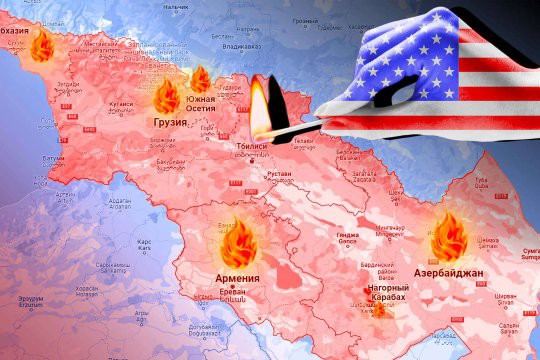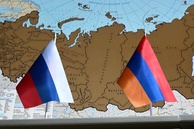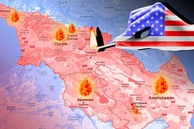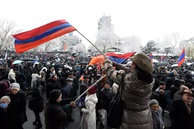The West has made new stakes in the big game in the South Caucasus, also known as Transcaucasia. This time it has staked on Armenia. On November 15, the US Senate passed a bill titled “Armenian Protection Act of 2023”[1]. The document envisages cessation of military assistance to Azerbaijan while allowing, as before, Washington to channel funds to Armenia as financial support for military purposes[2]. Judging by this, American lawmakers make no secret of their decision to financially support Yerevan for its position to move away from Moscow.
USA sets ground for destabilization in South Caucasus
Just six months ago everything was the other way round: Secretary of State Blinken said[3] then that Azerbaijan needed protection, meaning that there was a need to supply it with weapons. In addition, the Biden Administration demanded that the lawmakers allocate an extra 700,000 dollars to support the Azerbaijani army’s participation in international military exercises.
Significantly, the Pentagon’s support program for Azerbaijan in security issues has exceeded financial and military assistance to Georgia. For instance, on the eve of the war with Armenia in 2018-2019, Azerbaijan received more than 100 million dollars in US military assistance, according to the American news and analytical site EurasiaNet[4]. As the article points out, given that the USA has increased diplomatic and military pressure on Iran, it, without excessive publicity, allocated these resources to neighboring Azerbaijan for counteracting Tehran.
However, Iran and Azerbaijan have managed to reach a settlement, not without assistance from Russia and Turkey, which have absolutely no interest in fueling a conflict in the South Caucasus.
In response, the United States, still set on sowing instability in the region, found the “weakest link” represented by Armenia. Following the adoption of the above-mentioned Act by the Senate, it becomes clear who Armenian Prime Minister Nikol Pashinyan described as “new partners in security” after refusing to attend the summit of the Collective Security Treaty Organization (CSTO) on November 23.
USA agenda for Transcaucasia announced in Congress
Simultaneously with the Senate, the issue of Transcaucasia was also on the agenda of the hearings in the Committee of the House of Representatives at which one of the speakers was [5] Assistant Secretary of State for European and Eurasian Affairs James O’Brien. Openly, with the “Bolshevik-style straightforwardness”, he outlined the US agenda in the South Caucasus. In his words, the USA, while strengthening its presence in the region, is to secure the departure of Russian peacekeepers from Karabakh after the end of the five-year term: “If Armenia and Azerbaijan have an alternative [in other words, the presence of a NATO contingent – author’s note], there will be no more need for Russian peacekeepers”. Provision of security from regional powers Russia and Iran (without mentioning Turkey) was described by O’Brien as undesirable both for Armenia and for Azerbaijan, which, he said, would now choose “other options”.
Also, he said that the USA was devising a plan to support Armenia and coerce Azerbaijan into signing a peace treaty on its own [that is, American – author’s note] conditions. These conditions provide for ensuring the rights of Karabakh Armenians to return home under the protection of international guarantees, laying a transport corridor via Armenia and its control of it.
Although all this is seemingly humane and noble, history has demonstrated many times that “the road to hell is paved with good intentions”. A statement to that effect was made by Russian Foreign Ministry spokesperson M.V.Zakharova: “The United States and the European Union have acted as guarantors many times before. But very rarely did they succeed in producing something good out of it. In the majority of cases, they promise a lot, do little and use the situation for their own purposes”[6].
Condition One (according to O’Brien) – the return of refugees to Karabakh, provides for international guarantees to ensure their security. To this end, according to the American official, it is necessary to dispatch to Karabakh a West-controlled military contingent in place of the Russian one. The legitimacy of such a scenario should be enshrined in a peace treaty. Azerbaijan is categorically against the control of extraregional players over part of its territory, over which it has just regained sovereignty. Unlike the Russian peacekeepers, who perform the function of observers monitoring the security of people of different nationalities in accordance with Azerbaijan’s laws, a western contingent may become an instrument of pressure.
President Ilkham Aliev, fully aware of the looming threat, avoids negotiations on western venues where he might come under pressure. Supposedly, in order to force Azerbaijan to replace Russian peacekeepers in Karabakh with international “peacekeepers” in 2025, or deploy them there without Baku’s consent, the United States will try to resort to the well-tested information and diplomatic means. For a start, the West will deliberately try to overdramatize the issue of the return of Karabakh refugees, and then, after a propaganda campaign, will seek the needed solutions through international agencies. It needs reminding that even though it was aware of the dramatism of the Karabakh conflict, the West used to be indifferent towards both the military operations between Transcaucasian republics, and the blockage of the Lachin corridor. During the 44-day war London blocked the decision on the cessation of military operations in the UN Security Council.
The Azerbaijani president has a simple way out: to leave everything as it is. If Azerbaijan does not demand the withdrawal of Russian peacekeepers after their first mandate runs out, it will be extended without any authorization from Armenia, which de facto moved away from Karabakh. In this case, should the US attempt to exert pressure through the UN Security Council, using the refugee drama, Azerbaijan will be able to count on support from Russia. The more so since according to experts[7], up to 35% of Karabakh residents are planning to leave Armenia and settle in Russia in the coming year.
It looks like Baku has opted for the extension of the Russian peacekeepers’ mandate, which makes understandable the harsh reaction of the Azerbaijani Foreign Ministry (see below) to the overt statements by the American official.
Western Condition Two for a peace treaty, according to O’Brien, stipulates the obligatory laying of a route between Azerbaijan and Nakhchivan via Armenia. This condition should be considered in tandem with its interpretation: “A transport corridor which will be built in a different way [that is, NOT via Armenia – author], with the use of force, or with the participation of Iran, will face a decisive response”. Consequently, the USA is already considering Armenia a country under American control. Washington is thus planning to control the entire transport flow through the region. If the transport flow passes through Iran, the South Caucasus’ logistics may get out of western control.
Armenian leadership seeks praise from the West
Given the situation, it is no wonder Yerevan has radically changed its position on the opening of a transport corridor along its southern border, the so-called Zangezur corridor. Until recently, the Armenian leadership was flatly against the project, considering it a violation of its territorial integrity. However, pressed by the West, Yerevan made a dramatic turn of position at 180 degrees. On October 26, speaking at the “Silk Way” Forum in Tbilisi, Pashinyan said[8] that Armenia would like to become a “junction of peace” in Transcaucasia. The Armenian prime minister pointed out that the project included repairs, construction and maintenance of motorways, railroads, pipelines and electricity lines between Armenia, Turkey, Georgia, Azerbaijan and Iran. What catches the eye is that there is no mention of Russia. However, it is no other than Russia that, under specific conditions, monitors the gas piping, railway and electricity grids of Armenia. The logical question here is whether Yerevan is going to “diversify” the above-mentioned spheres.
Under pressure from the West Yerevan has resolved to waive its commitments under Provision 9 of the Trilateral Agreement of November 9, 2020, under which transport communication from Azerbaijan into Nakhchivan via the Syunik Province should be under the control of the Russian Border Service. After the opening of the corridor Russian frontier guards were to continue to perform their previous functions as they protect Armenia’s external borders in accordance with an agreement with the RA, not under an obscure international mandate.
Now, Yerevan demands that instead of Russian border guards the future Zangezur corridor via the Syunik Province should be guarded by frontier forces from Armenia proper[9], as Russian control of such a vital for the West transport artery runs counter to their plans. According to the EU, the Zangezur corridor should become part of a more global project, the Middle corridor, which will guarantee the export of Asian goods and Caspian energy carriers into Europe. Given that Russia is currently under European sanctions and its interaction with EU countries is limited, the European Union finds a route running from China bypassing Russia of particular importance.
Commenting on the change in the Armenian stance, Russian Foreign Ministry spokesperson M.V.Zakharova warned that “Armenia, acting on orders from the USA and EU, disregarding trilateral agreements, risks being cut off from the future configuration of regional communications”[10].
In the opinion of the Armenian opposition, Nikol Pashinyan is leading the republic towards “Ukrainization”, while “statehood has been put into politicial turbulence zone in order to prevent the implementation of Provision 9 of the document of November 9, 2020, which envisages the unblocking of communications under the control of the border forces of the Russian Federal Security Service”[11].
Such a seemingly unexpected turn of the USA towards Armenia was planned before. Having come to power following the colour revolution backed by the West, Pashinyan and his supporters must have been waiting for a suitable moment to begin a departure from Russia. It looks like the moment has come, their curators say. What is visible is the increasingly anti-Russian rhetoric on the part of Pashinyan, who makes it point to throw claims at Russia from tribunes or media of Russia-unfriendly countries. The Armenian prime minister has begun to sabotage [12] various meetings within the CSTO and economic agencies. Washington resolved that Yerevan had passed the point of no return in relations with Moscow and can now be trusted to simultaneously contain Iran, Russia, and even Turkey. This serves as yet another proof that dominating Armenia-America and Armenia-Europe relations is the anti-Russian sentiment.
Confrontation with Moscow is acquiring ever more hostile manifestations. For one, Nikol Pashinyan has met with Ukraine’s President Vladimir Zelensky in the past weeks, Armenian Security Council Secretary A.Grigoryan has visited Malta, where he discussed the “Ukrainian peace formula”, which provides for setting up a military tribunal against the Russian top political leadership. Grigoryan has also met with the head of the Ukrainian delegation in the Parliamentary Assembly of the Organization for Security and Cooperation in Europe N.Poturaev to discuss “regional issues”. Advisor to the head of the office of the President of Ukraine M.Podolyak has supported Armenia’s current policy saying that “Yerevan is on the right track”.
Tough response from Azerbaijan
Unlike the Armenian prime minister, the president of Azerbaijan has been pursuing a fairly independent policy, as long as it does not clash with ally relations with Turkey. Ilkham Aliev speaks to western countries – “the world’s strongest” – without sentiment. A year ago, he rejected mediation from France over its “destructive stance”[13] on peace process with Armenia and has since refused to take part in negotiations with the participation of France. He could not but respond to the unfriendly rhetoric from American lawmakers and lashed at the hegemon itself: the Azerbaijani Foreign Ministry told off[14] the USA and expressed doubts about its ability to perform the role of a mediator. In addition, Baku has accused Washington of resorting to double standards, undermining regional efforts to guarantee transport security and cancelled all high-level visits from the USA to Azerbaijan.
Baku has pointed out that the US foreign policy has suffered a complete fiasco in recent years, particularly in the Middle East and in Afghanistan. Given this, the republic opts in favor of the “3+2” format of talks with the participation of Azerbaijan, Armenia, Turkey, Russia and Iran.
Turkish leader Recep Tayyip Erdogan in his address to the nation [15] supported Azerbaijan and urged the Armenian authorities and the people of Armenia to seek security in peaceful cooperation with the neighbors, not with somebody “thousands of kilometers away” from the region. In his words, weapons supplies from the West will never be able to ensure lasting peace and security. Member of the Security and Foreign Policy Commission at the Presidential Administration Aygun Attar has accused the USA of hypocrisy and a desire to destabilize the situation in the South Caucasus[16].
How will peace talks end?
The impression of late is that the heads of Transcaucasian republics – Azerbaijan and Armenia – have been avoiding one another. Ilkham Aliev declined to visit the summit of the European Political Community in Granada on October 5, reportedly because of “the destructive position of France”[17] and did not come to Brussels at the end of October. Baku also cancelled a meeting of Azerbaijani and Armenian foreign ministers in Washington, scheduled for November 20. Nikol Pashinyan missed the CIS summit in Bishkek on October 13.. In absentia both announced 70% readiness of the draft of the peace treaty and said they were ready to sign it in the near future. However, the final agreement on the remaining 30% will depend on the venue. It looks like the main stumbling block now is not the essence of the issues under discussion or the approaches to it but the attempts of the West to channel the negotiations to serve western interests.
After the Congress published the US stance on Azerbaijan, Baku considers the Washington platform unacceptable. The European negotiation venue, particularly in the presence of France, no longer suits Baku. For this reason, the Brussels format is highly questionable as well.
For known reasons, Yerevan has been evading platforms proposed by Russia. Now that Armenia has openly won the support of France and the USA, Pashinyan needs the western format for talks, so that it could imposeits conditions on Azerbaijan, and not make any concessions.
Paradoxically as it might seem but it was in the course of western-format talks that Aliev, an experienced Soviet-school diplomat, achieved tremendous successes. In Brussels, Prague and Washington, Pashinyan, under pressure from western partners, who then staked on Baku, had to recognize the territorial integrity and sovereignty of Azerbaijan, including Karabakh. Having achieved his goals, Aliev lost interest in the western format and proposed negotiations without mediators on any mutually acceptable venue or on any conditional state border.
Considering that Pashinyan has a negative experience of one-on-one talks with Aliev, having suffered a fiasco in the debates with him at the Munich Conference in 2020, he is highly unlikely to go into talks without loyal mediators, even though previously, he tried to persuade Stepanakert to hold direct talks tete-a-tete with Azerbaijan.
In response to the Azerbaijani proposal to hold a bilateral summit, the Armenian leaders said they are ready to hold a meeting of heads of government commissions at the border on delimitation and demarcation of borders, and on the security of borders established in May 2022. The Armenian party demonstrated no reaction to Baku’s appeal to hold peace talks at the border without mediators. Judging by this, Yerevan is set on holding talks with the mediation of the USA and the EU, which it views as allies.
Armenia and the West have begun to advocate the need for guarantors to secure the implementation of agreements which could be signed in the talks. I would like to remind the reader about the idleness of the guarantors (foreign ministers of France, Germany and Poland) of the peace agreement between the opposition and the president in the course of the anti-constitutional coup in Ukraine in 2014. This time too, the West is trying to become a guarantor of a peace treaty between Azerbaijan and Armenia in order to secure a serious instrument of pressure to establish its geopolitical dominance in the South Caucasus.
Now, it all depends on how fierce Baku will be in resisting the western attempts to force it to accept its mediation.
The opinion of the author may not coincide with the position of the Editorial
[1] Text of S. 3000: Armenian Protection Act of 2023 (Passed the Senate version) - GovTrack.us
[2] In 1992 the US passed Freedom Support Act – for all former Soviet republics. After the first Karabakh war, the Armenian lobby in the USA secured a ban on any assistance to Azerbaijan (the only on the post-Soviet space), but in 2001 the Senate passed an amendment which allowed the president to ignore the ban (Part 907 of the Freedom Support Act). Since then, the ban was rejected for one year (and military assistance was rendered) until, in November 2023, the Senate passed a bill on the suspension of military assistance to Azerbaijan for 2024-2025 fiscal years.
[3] https://regnum.ru/article/3792599?ysclid=lpf9c4fpo7973646330
[4] https://eurasianet.org/amid-iran-crisis-us-offers-big-military-aid-boost-to-azerbaijan
[5] https://www.youtube.com/watch?v=EuEhHnwTlAg&t=2s The Future of Nagorno-Karabakh - YouTube
[6] Briefing of Russian Foreign Ministry official representative M.V.Zakharova, Moscow, November 15, 2023 – the Ministry of Foreign Affairs of the Russian Federation (mid.ru)
[7] https://www.caucasianknot.eu/blogs/83772/posts/60334
https://caliber.az/post/200347/?ysclid=lp9ksqhpgu569159543
[8] https://www.primeminister.am/ru/statements-and-messages/item/2023/10/26/Nikol-Pashinyan-Speech/
[9] https://news.ru/world/armeniya-otstranit-fsb-ot-zangezurskogo-koridora-pochemu-on-vazhen-dlya-rossii/?ysclid=ln7uf379e4775364674
[10] Briefing of Russian Foreign Ministry official representative M.V.Zakharova, Moscow, November 15, 2023 – Ministry of Foeign Affairs of the Russian Federation (mid.ru)
[11] https://www.golosarmenii.am/article/196456/stavshij-kievom-moj-erebuni-pochemu-protiv-armenii-formiruetsya-regionalnaya-koaliciya
[12] VZGLYAD/OSCE summit Pashinyan plays into Turkey’s hands :: V mire (vz.ru)
[13] https://www.trend.az/azerbaijan/politics/3806889.html
[14] https://www.mfa.gov.az/en/news/no65423
[15] https://www.trthaber.com/haber/gundem/cumhurbaskani-erdogan-israilin-antisemitik-yaftasi-vuramayacagi-tek-ulke-turkiyedir-814324.html
[16] Aygun Attar: USA playing in South Caucasus same game it played in Afghanistan and Iraq (apa.az)
[17]https://turan.az/ru/politika/ilxam-aliev-otkazalsia-ot-vizita-v-granadu-770057
read more in our Telegram-channel https://t.me/The_International_Affairs

 10:35 03.12.2023 •
10:35 03.12.2023 •



























